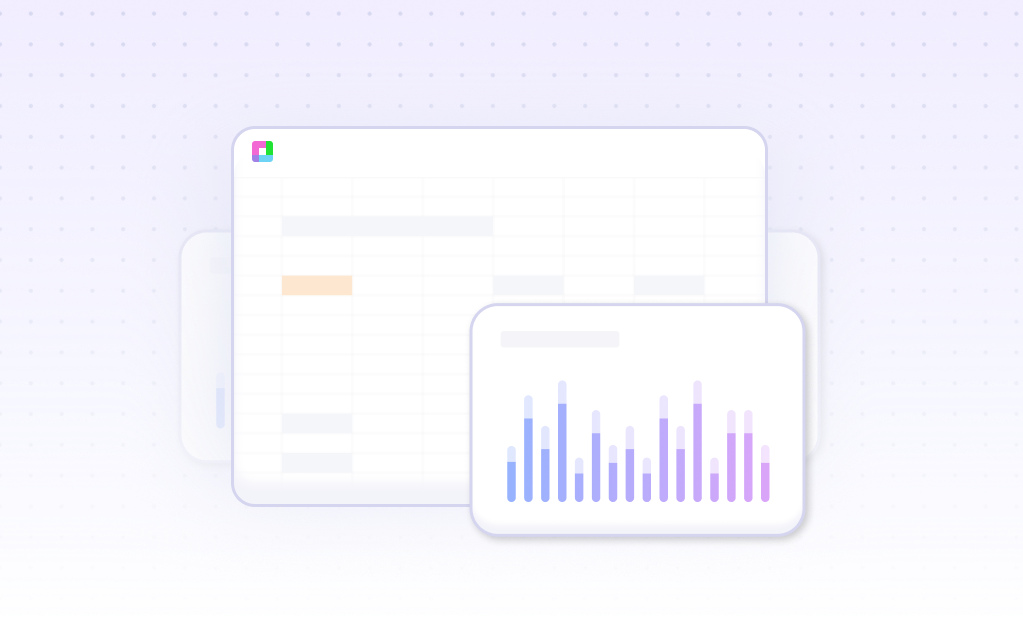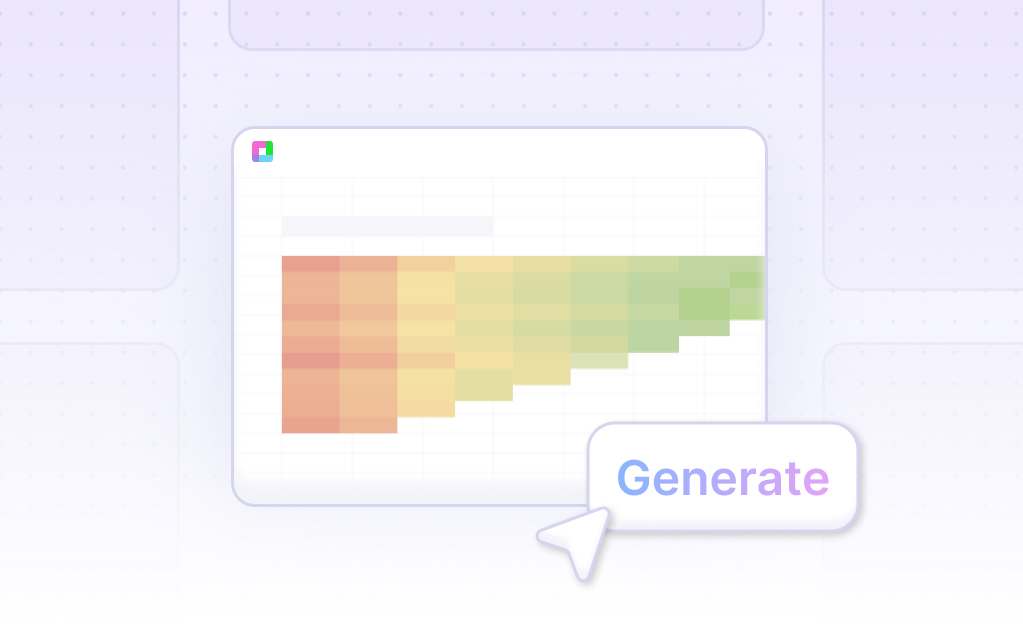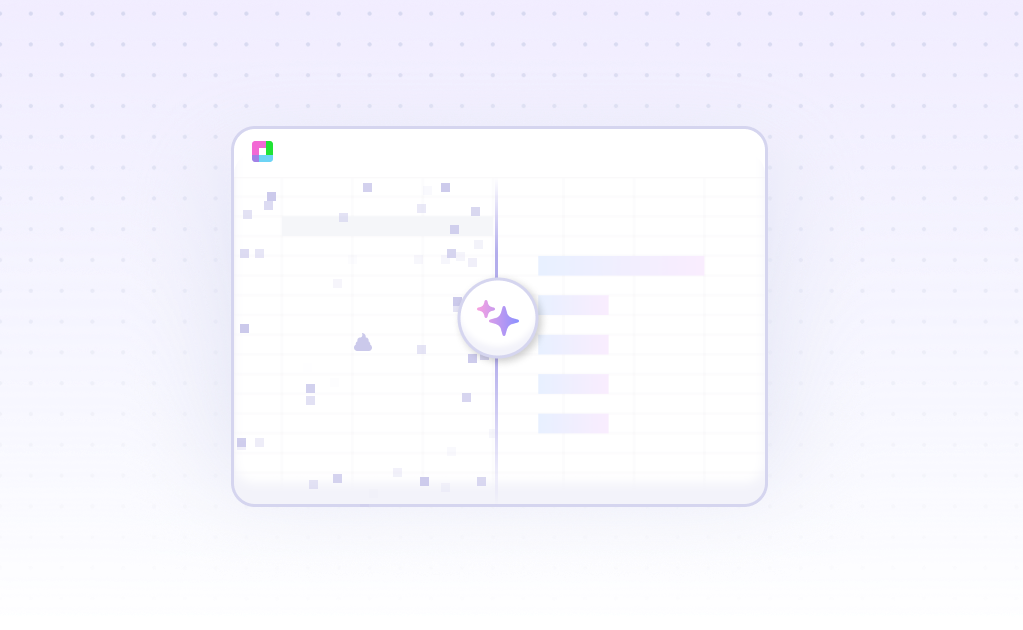
Generate a Cylinder 3-D Column Chart with AI
Create custom Cylinder 3-D Column Charts with Sourcetable AI. Generate data from scratch or upload your own to get started.
Introduction
Creating a Cylinder 3-D Column Chart can be a challenging task. Sourcetable simplifies this process by providing an AI spreadsheet assistant, making it accessible to users of all skill levels. Its AI tools allow you to generate intricate charts and graphs quickly.
If you prefer non-AI tools, traditional spreadsheet programs like Excel or Google Sheets can also be used to create these charts, although it might require more manual steps. Both techniques offer unique benefits depending on your needs and expertise.
For a seamless and efficient chart-making experience, sign up for Sourcetable at https://app.sourcetable.com/signup to generate your first Cylinder 3-D Column Chart. Alternatively, keep reading for more detailed instructions on both AI-driven and traditional methods.
See how easy it is to generate Cylinder 3-D Column Chart with Sourcetable

What is a Cylinder 3-D Column Chart?
Cylinder 3-D column charts are a specialized form of column or bar charts that use cylinder-shaped items to represent data points. These charts offer a visually dynamic way to display quantities.
Visual Characteristics
Cylinder charts can be stacked and shown in 3D. In 3D mode, these charts can be clustered along the Z axis, adding depth to the data representation without introducing additional data.
Memorability and Engagement
Using cylinder shapes in 3D charts can enhance memorability and leave a stronger impression on viewers. They may improve the presenter's impact and are often favored if specifically requested by clients.
Practical Applications
Cylinder 3-D column charts are versatile tools commonly used for visualizing various types of data, including but not limited to the number of confirmed COVID-19 cases in different age groups in Norway.
These charts are particularly useful when you need to convey data in a visually engaging way that can be easily remembered by your audience. While they do not add additional data, their unique visual properties can make the data more compelling.
When to Use a Cylinder 3-D Column Chart
Ideal Scenarios for Cylinder 3-D Column Charts
The Cylinder 3-D Column Chart is ideal for visualizing data that requires a clear comparison between different categories over time. It provides a visually engaging way to represent numerical data. Use it when aiming to make your presentations more dynamic and when the audience requires a quick, visual grasp of complex data sets.
Pros of Cylinder 3-D Column Charts
Cylinder 3-D Column Charts enhance the visual appeal of data presentations, making them more engaging. They allow for a clear distinction between categories, making it easier to compare values. The 3-D effect adds depth, helping to emphasize the differences in data points, which can be particularly useful in highlighting trends over a period.
Cons of Cylinder 3-D Column Charts
Despite their visual appeal, Cylinder 3-D Column Charts may lead to misinterpretation of data due to their complex appearance. They can obscure precise data values, making detailed analysis more challenging. The 3-D effect can sometimes distort perception, creating potential for misunderstanding the scale and relationships between the data points.
Comparison with Other Charts
When compared to traditional 2-D column charts, Cylinder 3-D Column Charts offer a more visually striking presentation but may sacrifice accuracy for aesthetics. Compared to line graphs, they are better at highlighting categorical comparisons but are less effective in showing trends over time. Bar charts offer similar comparisons without the visual distortion but lack the 3-D effect that can engage the audience more effectively.
How to Generate a Cylinder 3-D Column Chart with Sourcetable
- Creating a Cylinder 3-D Column Chart in Sourcetable AI is straightforward. Start by generating sample data using Sourcetable's AI assistant or upload your CSV file.
- Select the range of data you wish to visualize. Then, ask Sourcetable's AI assistant to create the Cylinder 3-D Column Chart for you. This method is more efficient than doing it manually in Excel or Google Sheets.
- Refine your chart by instructing the AI assistant to make specific changes. Adjust formatting, labels, and other chart elements to fit your needs. Sourcetable AI simplifies this process, making it quick and intuitive.
How to Generate a Cylinder 3-D Column Chart in Excel and Google Sheets
Creating a Cylinder 3-D Column Chart in Excel
To create a Cylinder 3-D Column Chart in Excel, open the worksheet and select the cells containing the data for the chart. Navigate to the Insert tab and click Charts. From the Chart dialog, select a 3-D Column Chart. This method allows you to visualize your data in a three-dimensional format, enhancing readability and presentation.
Customize the 3-D format by clicking on the chart element to change. Use the Current Selection group to alter specific chart elements. Adjust the depth and spacing for a more refined visual. Change the chart depth or gap width for better aesthetics and data interpretation.
Creating a Cylinder 3-D Column Chart in Google Sheets
In Google Sheets, start by selecting the cell range for your chart. Go to the menu and click Insert followed by Chart. In the Chart editor's Setup tab, choose Column Chart as the chart type. Navigate to the Customize tab and tick the checkbox for 3D in the Chart Style section.
Google Sheets provides various features such as tooltips for data points, and options for customizing the gridlines and tick values. Use the chart.draw() method to render the chart, passing the data and options arguments for configuration. Adjust the chart layout interface to improve data visualization.
Use Cases Unlocked by Visualizing Data Using a Cylinder 3-D Column Chart
Revenue Comparison Across Multiple Products |
Visualizing revenue data with a Cylinder 3-D Column Chart allows businesses to compare the performance of multiple products effectively. The 3-D effect differentiates product categories, making it easier to identify high and low performers. |
Sales Performance Over Time |
A Cylinder 3-D Column Chart is ideal for tracking sales performance over specific time periods. The depth and height of the columns provide clear insights into growth trends and seasonal variations. |
Regional Sales Analysis |
Use a Cylinder 3-D Column Chart to analyze sales data across different regions. This visualization helps pinpoint strong and weak markets, guiding strategic decisions for regional marketing efforts. |
Budget Allocation and Comparison |
Businesses can use this chart to compare budget allocations across departments. The 3-D columns make it easy to see which departments receive more funding and assess whether financial resources are distributed effectively. |
Customer Demographic Insights |
Visualizing customer demographic data with a Cylinder 3-D Column Chart helps identify key customer segments. This can inform targeted marketing strategies and improve customer engagement. |
Website Traffic Analysis |
Track website traffic data over time using a Cylinder 3-D Column Chart. The visual representation helps identify traffic spikes and trends, aiding in the optimization of digital marketing campaigns. |
Frequently Asked Questions
How can I make a 3-D chart easier to read?
Change the 3-D format, rotation, and scaling of the chart. Use transparency to improve the visibility of data markers.
How can I change the rotation of a 3-D chart?
Adjust the rotation settings in the chart's format options to get the desired angle.
How can I change the scaling of a 3-D chart?
Modify the scaling settings in the chart's format options to make it better fit your data.
How can I change the order of data series in a 3-D chart?
Reverse the order of the data series to prevent large data markers from blocking smaller ones.
How can I use transparency in a 3-D chart?
Increase the transparency settings to improve the visibility of all data markers in the chart.
Creating a Cylinder 3-D Column Chart
Throughout this guide, we've explored the essentials of generating a Cylinder 3-D Column Chart, a visually appealing way to represent data. We've detailed the steps for creating this chart using AI through Sourcetable, as well as manually using traditional spreadsheet applications like Excel and Google Sheets.
With Sourcetable's AI spreadsheet and its assistant, the process is streamlined, enabling anyone to efficiently create sophisticated charts and graphs. In contrast, traditional spreadsheets require more manual effort but remain a viable option for those familiar with their functionalities.
To experience the convenience and power of AI-driven data visualization, sign up for Sourcetable and generate your first Cylinder 3-D Column Chart effortlessly.
Recommended Guides
Connect your most-used data sources and tools to Sourcetable for seamless analysis.
Frequently Asked Questions
If your question is not covered here, you can contact our team.
Contact Us




